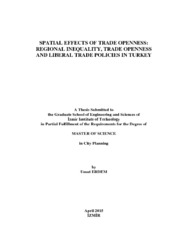Please use this identifier to cite or link to this item:
https://hdl.handle.net/11147/4432Full metadata record
| DC Field | Value | Language |
|---|---|---|
| dc.contributor.advisor | Duran, Hasan Engin | en_US |
| dc.contributor.author | Erdem, Umut | - |
| dc.date.accessioned | 2015-12-25T09:12:56Z | - |
| dc.date.available | 2015-12-25T09:12:56Z | - |
| dc.date.issued | 2015-04 | - |
| dc.identifier.citation | Erdem, U. (2015). Spatial effects of trade openness: Regional inequality, trade openness and liberal trade policies in Turkey. Unpublished master's thesis, İzmir Institute of Technology, İzmir, Turkey | en_US |
| dc.identifier.uri | http://hdl.handle.net/11147/4432 | - |
| dc.description | Thesis (Master)--Izmir Institute of Technology, City Plannig, 2015 | en_US |
| dc.description | Full text release delayed at author's request until 2016.05.06 | en_US |
| dc.description | Includes bibliographical references (leaves: 138-149) | en_US |
| dc.description | Text in English; Abstract: Turkish and English | en_US |
| dc.description | xi, 161 leaves | en_US |
| dc.description.abstract | Aim of the present thesis is to investigate impact trade liberalization on the evolution of regional income inequalities in Turkey between 1975 and 2011. Despite the large body of literature on this subject, there exist several directions which need to be furthert explored . i. so far in the literatur, the concept of trade openness is too broadly defined, However, it is not only 'trade' per se that can affect the regional economies but the composition of trade is also of great importance (Rodriquez-Pose and Gill, 2006). Indeed, it can be partitioned into several components, such as exports and imports (or manufacturing and agricultural trade) We analyze separately the impact of each component on the evolution of regional inequalities. ii. in most of the empirical studies dealing with this issue, neighboring regions are assumed to have no spatial economic interconnection between each other. We, therefore, incorporate spatial spillovers of trade and growth into our analysis.Our results can be summarized in three groups: First, regional inequalities tend to decline over the period of analysis. Second, initially poorer regions that experience an export-based liberalization (particularly in manufacturing goods, not in agricultural goods) trnd to grow faster than richer ones. Imports, on the other hand, heve an opposite effect. Third, the spatial spillovers of growth are found to evident across regions. Such that, growth in a region spilled over to the neighboring ones, positively. | en_US |
| dc.language.iso | en | en_US |
| dc.publisher | Izmir Institute of Technology | en_US |
| dc.rights | info:eu-repo/semantics/openAccess | en_US |
| dc.subject | Trade openness | en_US |
| dc.subject | Regional growth | en_US |
| dc.subject | Spatial statistics | en_US |
| dc.subject | Spatial panel regression | en_US |
| dc.title | Spatial effects of trade openness: Regional inequality, trade openness and liberal trade policies in Turkey | en_US |
| dc.title.alternative | Dışa açıklığın mekansal etkileri; Türkiye'de bölgesel eşitsizlik, dışa açıklık ve liberal ticaret politikaları | en_US |
| dc.type | Master Thesis | en_US |
| dc.authorid | TR53614 | en_US |
| dc.institutionauthor | Erdem, Umut | - |
| dc.department | Thesis (Master)--İzmir Institute of Technology, City and Regional Planning | en_US |
| dc.relation.publicationcategory | Tez | en_US |
| item.languageiso639-1 | en | - |
| item.fulltext | With Fulltext | - |
| item.openairecristype | http://purl.org/coar/resource_type/c_18cf | - |
| item.openairetype | Master Thesis | - |
| item.grantfulltext | open | - |
| item.cerifentitytype | Publications | - |
| Appears in Collections: | Master Degree / Yüksek Lisans Tezleri | |
Files in This Item:
| File | Description | Size | Format | |
|---|---|---|---|---|
| T001363.pdf | MasterThesis | 4.54 MB | Adobe PDF |  View/Open |
CORE Recommender
Page view(s)
194
checked on Jul 22, 2024
Download(s)
164
checked on Jul 22, 2024
Google ScholarTM
Check
Items in GCRIS Repository are protected by copyright, with all rights reserved, unless otherwise indicated.